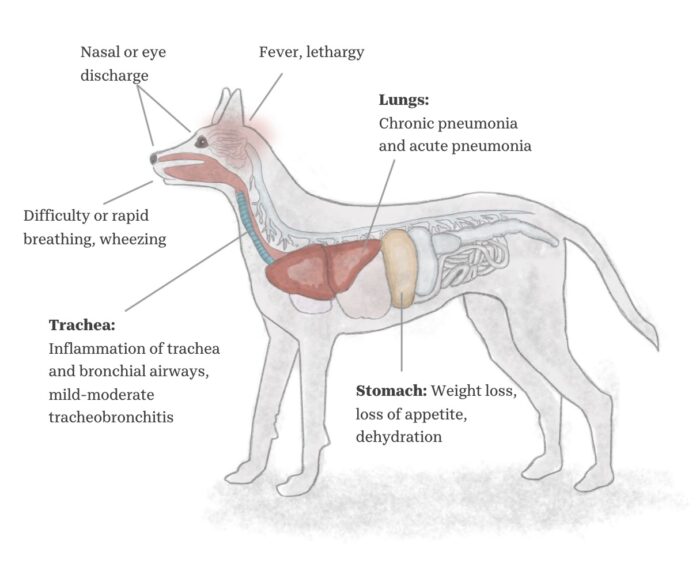by Jessica Park
In the hearts of homes across the nation, our faithful canine companions bring joy, companionship, and a lot of tail-wagging excitement. Yet, a shadow has fallen on this idyllic picture. Recent reports from USA Today reveal a mysterious respiratory illness sweeping through our dog-loving community, affecting furry friends in 16 states since last August. The question on every dog lover’s mind: what is this unseen threat?
For us, as devoted pet parents, our dogs are more than just pets; they are cherished members of our families. Imagine this: your loyal confidant is exhibiting symptoms reminiscent of the common kennel cough, yet with a perplexing twist–conventional treatments prove ineffective, and, heartbreakingly, some beloved companions have succumbed to this mysterious ailment.
What lies at the root of this canine respiratory conundrum? The answer remains elusive, shrouded in uncertainty. Yet, researchers in New Hampshire have uncovered a potential culprit—a subtle pathogen stealthily infiltrating our pets’ respiratory systems. This pathogen is a key player in the intricate Canine Infectious Respiratory Disease Complex (CIRDC), a term that echoes through veterinary circles.
The picture below shows mysterious symptoms found throughout 2023. Veterinary professionals are reporting a surge in severe cases where dogs struggle for breath, their mucous membranes betraying ominous hues. Heart rates spike, and abnormal vitals paint a grim picture. These alarming symptoms have us, the guardians of our four-legged companions, on high alert.
What accounts for this surge in atypical respiratory diseases among our furry friends? Some experts suggest a decline in vaccination rates, leaving our beloved pets vulnerable to this unseen adversary. How can we shield our furry family members from this invisible threat? Here are the key strategies:
- Avoid Boarding in High-Risk Areas: Refrain from boarding your dog in areas with a high concentration of other dogs.
- Ensure Full Vaccination: Keep your dog’s vaccinations up to date to provide essential protection against respiratory diseases.
- Monitor for Symptoms: Regularly monitor your dog for signs of infection, such as persistent coughing or breathing difficulties. Promptly consult a veterinarian if any symptoms arise.
As the canine respiratory outbreak continues to raise concerns among pet owners and veterinary professionals, staying informed and taking preventive measures is crucial. By understanding the nature of the illness, recognizing symptoms, and following recommended precautions, we can collectively contribute to the well-being of our beloved furry companions. Stay vigilant, be proactive, and ensure the health and happiness of your canine friends.

